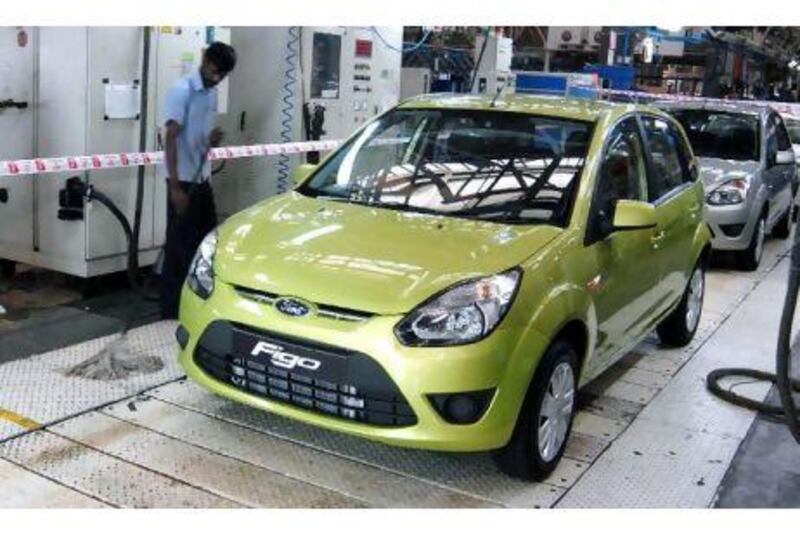The car giant Ford is taking a US$1 billion (Dh3.67bn) risk to build a car factory in India just as sales in the country stall.
The US car maker announced last week the investment to build a car factory in the western state of Gujarat within the next three years. It will be Ford's second production unit in India, one of the world's fastest-growing car markets and a beachhead for the Detroit company's global ambition of doubling its annual sales in the next four years to 8 million vehicles.
But the foreign investment - one of the largest received by Gujarat, known for its business-friendly and pro-reform government - comes at a time when car sales in India are slowing because of rising fuel prices and high interest rates that have been raised 11 times in the past year-and-a-half to quell stubbornly high inflation.
Car sales in India grew at a record 25 per cent to 2.5 million units in the previous fiscal year that ended on March 31, buoyed by brisk economic growth and strong demand from the country's free-spending middle class. But sales are now expected to grow at just 10 per cent this fiscal year. In June, sales rose by a meagre 1.6 per cent, the slowest pace in more than two years.
But Joe Hinrichs, the president and chief executive of Ford's Asia Pacific and Africa regions, plays down the slowdown as "temporary". The company, like most other foreign car makers such as Toyota, Honda, Nissan and Volkswagen, is betting on "dynamic regions of the world" - mainly Brazil, Russia, India and China - to offset the sluggish demand for cars in developed economies.
"We are aggressively expanding in markets around the world which have maximum growth potential," Mr Hinrichs said, pointing out that with the new 185-hectare facility in Gujarat, Ford's total investments in India have jumped to $2bn. "This is a bet on our future in India, but also a bet on the auto industry's future in India."
Other foreign car makers are similarly raising investments, expanding production and unveiling new models in India, with a keen focus on exports. Toyota, the world's biggest car maker, says that by 2013 it plans to invest $220 million to double its production capacity to 310,000 vehicles from the current 160,000. Toyota, which operates in India through a joint venture with the country's Kirloskar Group, reported a 94 per cent rise in sales in June compared with the same month last year. Sales were boosted by the Etios, its popular sedan model, which alone accounted for 50 per cent of sales.
Sales at Nissan Motor also rose 21 times in June from the same month a year earlier. Its domestic sales for the month stood at 1,632 units, with exports at 9,072 units.
India's automotive sector, which employs 10 million people, has long been hailed as a major growth driver of the economy. It accounts for 6 per cent of GDP and has an annual turnover of $73bn. By 2016, that figure is expected to rise to $145bn, says the Society of Indian Automobile Manufacturers (Siam), an industry lobby group based in New Delhi.
The global consultancy firm Ernst & Young says India is expected to become the world's fastest-growing car market between now and 2020.
At this rate of expansion, experts predict that by 2050 every sixth car in the world will be produced for the Indian market. At present, only eight among every 1,000 Indians own a car, according to the credit rating agency Crisil, based in Mumbai.
But rising interest rates are having a "devastating effect" on the industry, says Pawan Goenka, the president of Siam.
"Policy rates are changing beyond what we had expected three months ago … if there is any further increase, it will severely impact sales," he said.
Unlike most foreign car makers, Maruti Suzuki, India's largest car maker and majority-owned by Japan's Suzuki Motors, sells nearly half of its passenger cars in the domestic market. Sales dropped by almost 9 per cent to 80,298 vehicles in June, its first reported fall in two-and-a-half-years. The company was also hit hard by a workers' strike at one of its plants in northern India that led to a production loss of about 16,000 cars.





